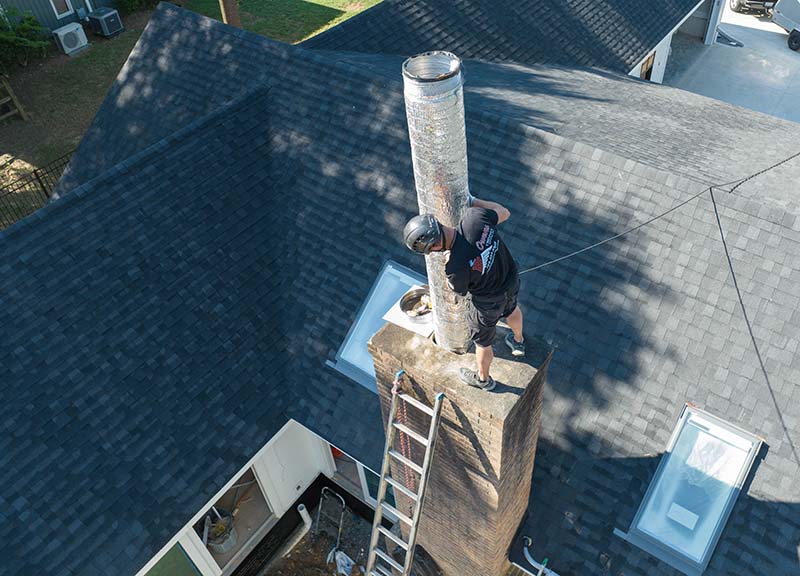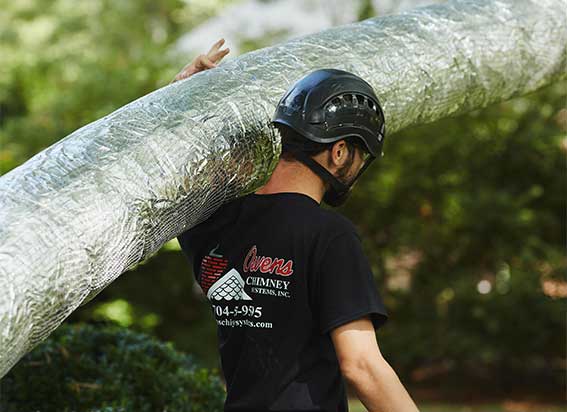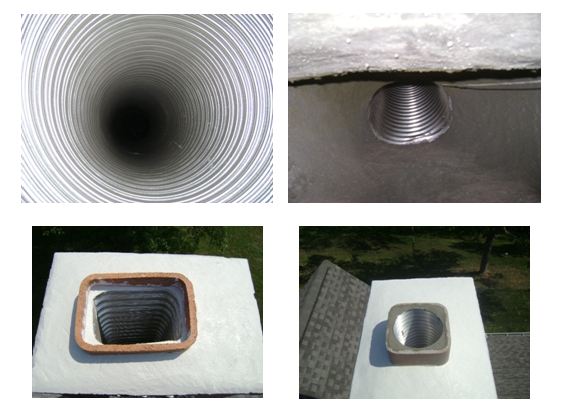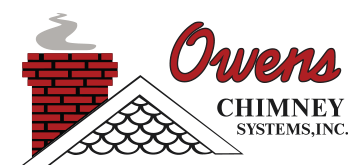Seeking Stainless Steel Flue Liner Replacement in Charlotte, NC? We Can Help
What is a chimney liner? What does a chimney liner do? How do I choose the right flue liner? How long does a chimney liner last? These are all great questions, and ones we’re happy to answer for you. There’s a good chance your Charlotte, NC chimney needs a stainless steel liner installation completed…and we’re the team to help with that (as well as any other chimney relining needs).
Ready to get started? Call or reach out to us online today.
What Is a Chimney Liner?
A chimney liner, sometimes called a flue liner, is essentially a protective sleeve that is installed inside your chimney. It acts like a barrier between the hot flue gases and the masonry of your chimney. Think of it like a dedicated tunnel for smoke and harmful gases to safely exit your home instead of seeping into the surrounding structure.
The chimney liner not only prevents fires and protects your home and loved ones from exposure to dangerous gases, but it also helps improve fireplace efficiency and increase the longevity of it.
Liners come in various materials such as clay tile, cast-in-place, and – you guessed it – stainless steel liners. Each material has its own advantages and disadvantages, but personally, we prefer to work with stainless steel liners because of their durability, safety, flexibility, and easy installation. We also recommend and use stainless steel lining kits (full kits) for a direct connection to wood stoves.

Here is an overview of the different stainless steel types we use:
- 16 Type Stainless Steel: Can be used for woodburning, coal burning, oil burning and category 1 gas. (This is what we use 95 percent of the time due to the wide range of fuels used in fireplaces / chimneys.)
- 304 Type Stainless Steel: Would be used by us for solid fuel burning conditions (pellet stoves, wood stoves, open wood-burning fireplaces) only. The reason is a lot of consumers tend to convert to gas. One might think that the ideal material for these liners would be 304 stainless steel. Well, the flexible pipe manufacturers tried this, and the chlorides in the exhaust vapor of natural gas caused corrosion.
Ask us about the lifetime guarantee!
How Do I Know My Chimney Needs a New Liner?
You might be surprised to know that your chimney system has a few different working components that help you achieve a warm home. So, without a proper chimney inspection, it’s hard to accurately diagnose the exact problem you’re having.
However, there are a few telltale signs that point to a chimney liner problem. If you notice any of the following, give us a call:
- Cracks & Gaps: Even though cracks and gaps might seem like minor inconveniences, these small imperfections can actually lead to significant damage and increase the risk of dangerous smoke and gases entering into your living space.
- Heat Loss: Have you noticed a decline in how well your fireplace heats your home? The damaged flue liner could be making it hard to contain warm air, thus decreasing efficiency and increasing your monthly utility bills.
- Stains & Leaks: Stains on the ceiling or walls near the chimney may point to a water leak, which can also be caused by a damaged chimney liner. Remember, water damage doesn’t stay confined to one area – it quickly spreads, potentially causing serious structural issues. So it’s important that, if you suspect a water leak, you act fast.
- Visible Deterioration: Flaking, spalling, or eroded mortar joints on the interior of your chimney also demand immediate attention. While it is common for liners to age and show some wear and tear, any signs of severe deterioration require a call to Owens Chimney Systems.
- Rust or Corrosion: When certain metals come in contact with water for an extended period of time, you’ll find rust. Rust leads to corrosion, and a corroded chimney liner spells disaster for your homes and loved ones. That’s why regular inspections and maintenance are important in order to not only help identify and address these issues, but to (ideally) avoid them altogether.


How Is a Chimney Liner Installed – Can I Just Do It Myself?
If you are not sure you need a new liner or need a second opinion, call a certified technician from Owens Chimney Systems to inspect your chimney today. We can provide you with digital pictures so you can see the damage and problems firsthand.
Now, DIY chimney liner installation… Is it feasible? While the idea of a new chimney liner might seem relatively straightforward, the installation process involves multiple steps that are extremely important to get right in order to have a safe and efficient fireplace to use. So although you might be tempted to save a few bucks and give this project a go yourself, we recommend you call the experts at Owens Chimney Systems.
Any time we install a stainless steel liner, whether we take out the existing flue tiles or not, we insulate the liner with an approved insulation mix or insulation blanket. The insulation mix has to be poured around the liner at a minimum one-inch thickness. The insulation blanket has to be a minimum of ½-inch thickness or a minimum of ¼-inch thickness depending on the situation. Insulating the liner is an important step not to be overlooked in the process of replacing or adding a stainless steel liner to your chimney system.
Then, we measure and cut the exact length of the chimney liner you need, securely anchor it to the top and bottom of the chimney, meticulously seal any gaps between the liner and chimney, and finish off the chimney with a properly fitted chimney cap to prevent any future water damage.
Prioritize Peace of Mind with a Chimney Liner Install by a Certified Professional
Don’t gamble with your safety or your chimney’s performance. Invest in a professional chimney liner installation and enjoy the warmth and comfort of your fireplace with complete peace of mind.
The certified chimney technicians at Owens Chimney Systems have the training and experience to identify any existing issues in your chimney, and provide the right solution to get you back to those warm and cozy nights by the fire.
Call us today at 704-686-8669 or request an appointment online.
If you think you might need some chimney repairs, you can count on our chimney relining and restoration experts.
